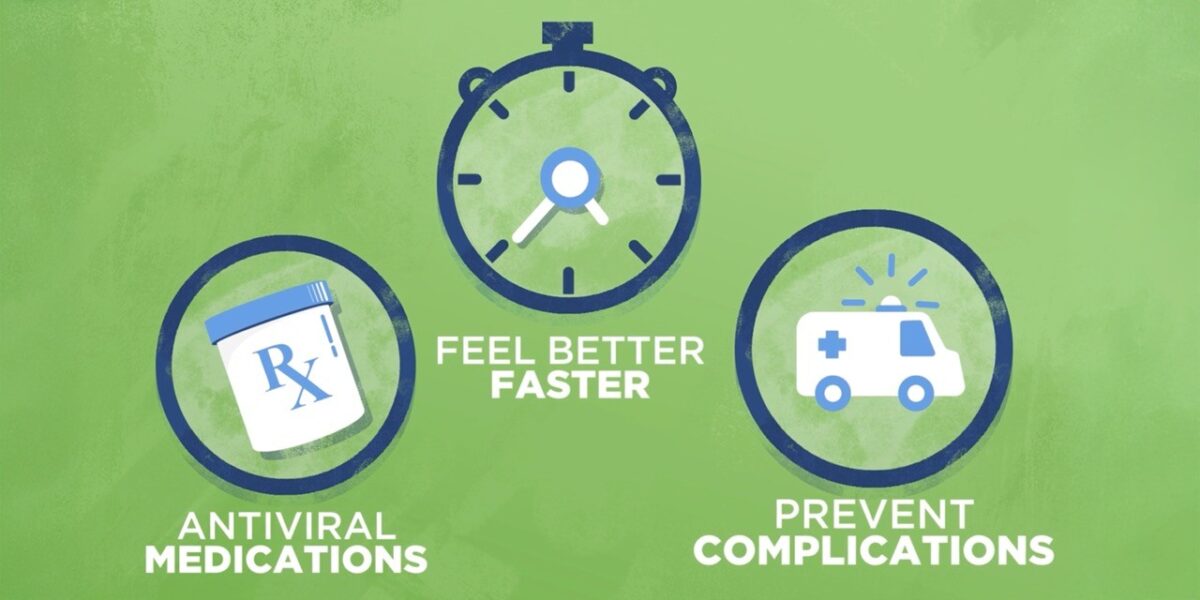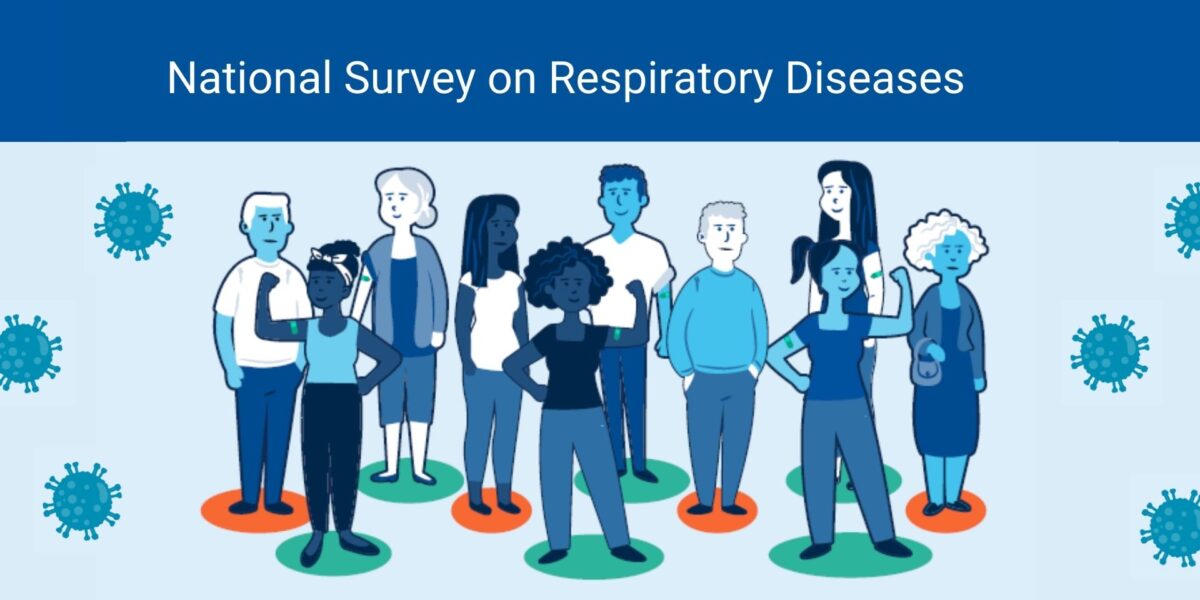
The National Foundation for Infectious Diseases (NFID) commissioned an annual survey to better understand beliefs about influenza (flu) and pneumococcal disease, as well as attitudes and practices around vaccination, including the impacts of the COVID-19 pandemic.
Survey findings highlight the need to raise awareness about the benefits of vaccination in preventing serious complications of respiratory diseases, including hospitalization and death; the importance of a strong vaccine recommendation by trusted healthcare professionals; and the need to address misconceptions about flu, pneumococcal disease, and COVID-19. The survey, conducted August 11-15, 2022, included 1,005 complete responses—946 via the web and 59 via telephone—from US adults age 18 years and older representing the 50 states and the District of Columbia.
Summary of Key Results
Attitudes and Practices around Flu Vaccination
Overall, most US adults believe annual flu vaccination is the best protection against flu, but many do not plan to get vaccinated against flu during the 2022-2023 flu season
- 69 percent agree that annual flu vaccination is the best preventive measure against flu-related deaths and hospitalizations but only 49 percent plan to get a flu vaccine during the 2022-2023 flu season
- 41 percent are either unsure or do not plan to get vaccinated against flu during the 2022-2023 flu season
- 65 percent of adults age 65 years and older plan to get a flu vaccine compared with only 45 percent of adults age 18-64 years who plan to get a flu vaccine
Among those who do not plan to get a flu vaccine, top reasons cited include:1
- 41 percent do not think flu vaccines work very well
- 39 percent are concerned about potential side effects from the vaccine
- 28 percent said that they never get the flu
- 24 percent are concerned about getting flu from the vaccine
- 20 percent do not think flu is a serious illness
- Of concern, about 1 in 5 (22 percent) who are at higher risk2 for flu-related complications said they were not planning to get vaccinated this season
Flu Vaccine Recommendations for Adults 65+
- 78 percent of US adults age 65 years and older are aware that certain flu vaccines, including higher dose and adjuvanted flu vaccines that are designed to trigger a stronger immune response, are now preferentially recommended for older adults (65+)
- Only 42 percent of younger adults (age 18-64 years) are aware of the new preferential recommendation for older adults (65+)
Sources of Information and Trust
Healthcare professionals are the primary and most trusted source of information about flu and flu vaccination
- 76 percent of US adults trust healthcare professionals a great deal or a lot for flu vaccine information, far more than other sources3
- 53 percent of US adults trust the Centers for Disease Control and Prevention (CDC) a great deal or a lot for flu vaccine information
- Hispanic adults are less trusting of healthcare professionals than White adults (62 percent vs 79 percent) and less trusting of the CDC (37 percent vs 56 percent)
Concerns about Other Respiratory Infections
US adults are more likely to worry about themselves or someone in their family getting COVID-19 than other respiratory infections
- Only 34 percent are very or extremely worried about COVID-19 infection
- Only 20 percent are very or extremely worried about flu infection
- 20 percent are very or extremely worried about pneumonia
- 17 percent are very or extremely worried about respiratory syncytial virus (RSV)
Impact of COVID-19 Pandemic on Flu Vaccination Intention
For most US adults, personal experience with COVID-19 does not change how likely they are to get a flu vaccine this year. Among those who have tested positive for COVID-19:
- 1 in 4 (25 percent) say it makes them more likely to get vaccinated against flu
Concerns about Flu and COVID-19 Vaccine Coadministration
US adults are not very confident about the safety of getting flu and COVID-19 vaccines at the same time
- Only 32 percent are extremely/very confident about the safety of receiving flu and COVID-19 vaccines at the same time
- 37 percent are not very or not at all confident in the safety of getting a flu and COVID-19 vaccine at the same time, while 30 percent are only somewhat confident in the safety of getting vaccinated against both flu and COVID-19 at the same time
- 36 percent say they would receive both vaccines at the same time if offered, 41 percent say they would not, and 23 percent are unsure
Confidence in vaccine coadministration differed by race and education levels:
- 48 percent of both Black and Hispanic adults say they have little or no confidence in the safety of getting vaccinated against flu and COVID-19 at the same time, compared with 35 percent of White adults
- 42 percent of US adults without a college degree have little or no confidence in the safety of getting vaccinated against both flu and COVID-19 at the same time, compared with 27 percent of college graduates
Mask Behaviors During Flu Season
- A majority of US adults (58 percent) report that they will wear a mask at least sometimes during flu season
- 40 percent of US adults will wear a mask if flu and/or COVID-19 activity is high in their community
- 35 percent will wear a mask around crowds and large groups of people
- 22 percent will wear a mask indoors
- 21 percent of US adults will wear a mask only if required and 16 percent say they will not wear a mask
- Black adults (78 percent) are more likely than White adults (52 percent) to wear a mask during flu season
- Women (66 percent) are more likely than men (50 percent) to wear a mask during flu season
Flu Antiviral Medication to Mitigate Flu Symptoms
A majority of US adults would take flu antiviral medication to help reduce severe flu symptoms if prescribed by a healthcare professional
- 78 percent of US adults would be willing to take flu antiviral medication if prescribed by a doctor or other healthcare professional to help reduce severe flu symptoms
- White adults (82 percent) are more likely than Hispanic adults (69 percent) and Black adults (67 percent) to take antiviral medication if prescribed
- 21 percent of US adults would not be willing to take flu antiviral medication if prescribed by a doctor or other healthcare professional to help reduce severe flu symptoms
- Adults age 65 years and older (88 percent) are more likely than younger adults4 (75 percent) to say they will take flu antiviral medication if prescribed
Knowledge and Attitudes around Pneumococcal Disease
Among adults age 65 years and older, or those with an underlying health condition who are at higher risk for pneumococcal disease, there are gaps in awareness and understanding about pneumococcal disease and vaccination
- 45 percent of those at higher risk are not familiar with pneumococcal disease
- 29 percent of those at higher risk have been advised to receive a pneumococcal vaccine
- Among those who have been advised to get vaccinated, the majority (74 percent) have received a pneumococcal vaccine
- Among those who are unsure or do not plan to get a pneumococcal vaccine, the top reason (57 percent) cited was that their doctor has not recommended it1
Key Messages
Survey findings reinforce the importance of raising awareness and addressing misconceptions about flu, pneumococcal disease, and COVID-19 vaccines, and the importance of healthcare professionals strongly recommending vaccines for their patients.
- Safe, effective vaccines are available in the US to help prevent flu, pneumococcal disease, and COVID-19
- Even in cases when flu vaccination does not prevent infection completely, it can help reduce the severity and duration of illness and prevent serious complications, including hospitalization and death6
- It is safe to get a flu vaccine at the same time as a COVID-19 vaccine
- Certain flu vaccines, including higher dose and adjuvanted flu vaccines, are recommended to help boost an immune response specifically in adults age 65 years and older
- Both flu and pneumococcal disease vaccination should be part of the routine management of patients with chronic health conditions
- Annual flu vaccination is important to protect yourself, your loved ones, and your community (especially those who are most vulnerable, including young children, adults age 65 and older, and those with chronic health conditions)
- For more than 50 years, hundreds of millions of individuals in the US have safely received seasonal flu vaccines7
- Getting vaccinated, handwashing, wearing a mask, and staying home when you are sick can help stop the spread of flu, COVID-19, and other respiratory viruses
The survey findings also underscore the need to address health disparities and educate populations at increased risk, including older adults and individuals with chronic health conditions such as lung disease, heart disease, and diabetes, who are at higher risk for complications from flu, pneumococcal disease, and COVID-19.
About the National Foundation for Infectious Diseases
Founded in 1973, the National Foundation for Infectious Diseases (NFID) is a non-profit 501(c)(3) organization dedicated to educating the public and healthcare professionals about the burden, causes, prevention, diagnosis, and treatment of infectious diseases across the lifespan. For more information, visit www.nfid.org.
About the Survey
This NFID survey was conducted by NORC at the University of Chicago. Data were collected using the AmeriSpeak Omnibus®, a monthly multi-client survey using the NORC probability-based panel designed to be representative of the US household population.
Interviews for this survey were conducted between August 11 and 15, 2022, with adults age 18 years and older representing the 50 states and the District of Columbia. Panel members were randomly drawn from AmeriSpeak, and 1,005 completed the survey—946 via the web and 59 via telephone. Interviews were conducted in English. The final stage completion rate is 14.7 percent, the weighted household panel response rate is 20.3 percent, and the weighted household panel retention rate is 78.4 percent, for a cumulative response rate of 2.3 percent. The overall margin of sampling error is +/- 4.2 percentage points at the 95 percent confidence level, including the design effect. The margin of sampling error may be higher for subgroups.
Once the sample has been selected and fielded, and all the study data have been collected and made final, a poststratification process is used to adjust for any survey nonresponse as well as any noncoverage or under and oversampling resulting from the study specific sample design. Poststratification variables included age, gender, census division, race/ethnicity, and education. Weighting variables were obtained from the 2022 Current Population Survey. The weighted data reflect the US population of adults age 18 years and older.
1Top responses reflect survey respondent answers when asked to select “all that apply.”
2People at higher risk for complications from flu or pneumococcal disease as defined in the survey include those age 65 years and older, tobacco smokers, and those with diabetes, asthma, chronic obstructive pulmonary disease (COPD), heart disease, stroke, or kidney disease.
3Responses reflect survey respondents ranking selections on a scale of “trust a great deal/a lot,” “trust somewhat,” and “trust a little/not at all.” Healthcare professionals include doctors, nurses, pharmacists, and other healthcare professionals.
4Younger adults are defined as individuals age 18-64 years.
5Underlying conditions are defined in the survey as smoking, diabetes, asthma, heart disease, and/or kidney disease.
6Misconceptions about Seasonal Flu and Flu Vaccines | CDC. Centers for Disease Control and Prevention. www.cdc.gov/flu/prevent/misconceptions.htm. Accessed September 2022.
7Centers for Disease Control and Prevention. Flu Vaccine Safety Information: Q&A. www.cdc.gov/flu/prevent/general.htm. Accessed September 2022.
October 2022
Reviewed March 2023
Related Resources

Dan’s Story (Pneumonia)
Dan has a chronic health condition. This makes him more likely to get pneumonia. A vaccine may have saved his life.

Influenza Antivirals Fact Sheet
A shareable fact sheet on influenza antivirals highlights their role in managing flu, especially for those at high risk of severe complications.

2025 National Survey on Respiratory Diseases
The 2025 national survey examines attitudes and behaviors regarding flu, RSV, COVID-19, and pneumococcal disease.
